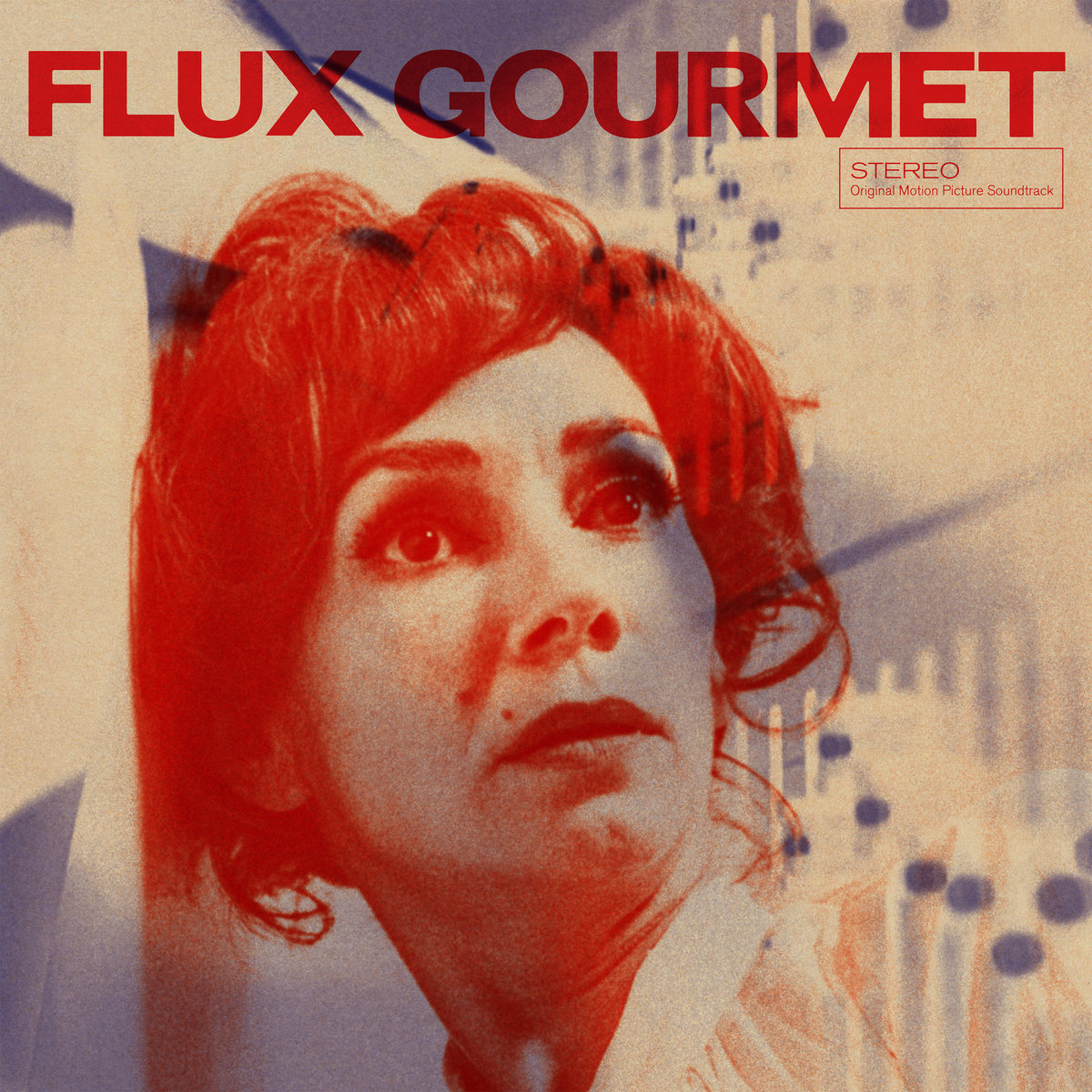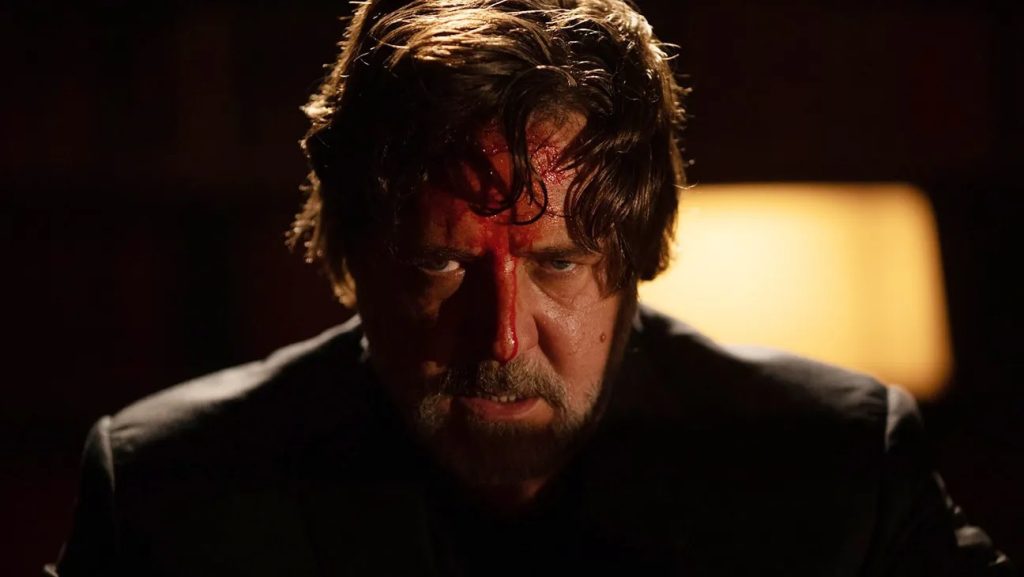Director Peter Strickland’s films explore texture of all varieties – physical, sonic, epicurean – and his 2022 film Flux Gourmet manages to mix all three to a level of heightened madness even longtime fans of the director’s films might be surprised by. That said, the mixture of gastronomic delights and auditory experimentation makes for a fascinating viewing and listening experience, allowing for a near-complete immersion in the world of “a dysfunctional group of performance artists.”
We spoke with director Strickland about the score for Flux Gourmet, which saw a physical release from Ba Da Bing Records in January and features Strickland returning to the world of sonic adventures with his former creative in The Sonic Catering Band.

STARBURST: As a director, what attracts you to the idea of some of these very interesting professions that you’ve explored in your films?
Peter Strickland: Well, I think it depends on the film. Some films, such as Barbarian Sound Studio, were. I think so many films have been done about actors or directors. You just want to look at the more invisible jobs, really. And there’s a film just out now called Jill Uncredited, which is about an extra, and you always wonder about those people, so there’s an element of that.
Flux Gourmet was a lot more straightforward because I actually was in a band like that. I was a bit of a narcissist to make a film about that. It was the same as if you’re in Queen doing a Queen biopic or an Elton John biopic, just slightly different music. The impulse was kind of similar.
We love the attention that you have to sound in Flux Gourmet and Berbarian. What was your musical history? What was that band that led you to integrate sonics so well into your films?
Well, when we started in 1996, there were many years of working a certain way. I think the way we worked was quite naïve, really. How most people start: you get a tape delay, you get a bit of reverb, and you just drench everything through these units. But I think the way we’re using the word, the way we were taking sonics down from everyday sources, like cooking and recontextualising it, chopping it up, and treating it like a raw material to mix and layer and process – I took that way of working into my feature films, but not as a gimmick, really.
It was just that’s all I knew. I never really worked. I was a naïve thing. And it was weird because when we did the band, mostly in the 1990s and early 2000s, we were lucky if we could get a review in The Wire magazine. We could never sell many records, so most of the time, we were just invisible. We were not attracting attention. It was weird; when you put that same process to filmmaking, it did attract attention.
The idea of Flux Gourmet feels very real. It would not surprise us if there were a place such as this, and we think that the thing that we enjoy about your movies is that while they do seem somewhat outrageous, they’re rooted in reality. Is that a process that you consciously go for?
I wouldn’t say consciously. I mean, it depends on each film. But if I look back on them, they’re all rooted in very real situations or emotions, group dynamics, couple dynamics. I mean, the way you do the window dressing, it can be out of time somewhat. Sometimes, it’s best, just due to budget and circumstances, but I think if you strip the surface weirdness away, to me, they’re dramas. They’re all about anything, but I’m just fascinated by different characters, really, and I think the whole band dynamic is incredibly rich for exploring egos and rivalries. That’s the place to go to if you want to explore that.
How did you assemble all of the folks for the Flux Gourmet soundtrack?
Well, it was a mixture. It was mostly people I knew. Some of them were people from my band. Colin Fletcher and Tim Kirby, the three of us had that band together, the Sonic Catering Band. That was very easy. I just called them. I said, “Do you want to get back together for a couple of weekends and do some stuff?” I worked with the others before.
Roj, he used to be in Broadcast, he did some stuff for my first film, actually, Katalin Varga. I worked with Jeremy Barnes and Heather Trost before. I did a music video for them, and they did a soundtrack for a short film I did. Tim Gane from Cavern of Anti-Matter did my previous film, In Fabric, so yeah, I guess it was not really anything to it. I just knew these people anyway. Just picking up a telephone and seeing if they’re interested. I’m obviously thinking about who is going to work for which scene.
It wasn’t a sort of a casual pick up the phone, it was a lot of thought beforehand because I think I knew going into it, it could not be like my other films in terms of most of my films had just one main composer or main band, and that was it. There was a kind of cohesiveness to it all, whereas I knew Flux couldn’t really function like that.
It was a bit of umming and ahhing, “How is this going to work? And “Who’s going to go where?”
That’s an interesting idea that you reached out to a lot of people with whom you’ve worked before, because your work has a recurring series of folk who pop up here and there, like Fatma Mohamed or Gwendoline Christie. Is it comforting, or is it just that you like working with these people to have a regular cohort of people whom you can bring into your films?
I think it depends. I mean, there’s definitely, as a film fan, an appeal to certain directors who always bring back the same acting troupe. I used to love when you’d watch a John Waters film, “What’s Divine going to do now?” I love that. It’s the element of both continuity and the element of surprise because you know that actor’s going to do something very, very different. Not just John Waters, but Fassbinder and Bergman. I didn’t go into this thinking I’d have that kind of relationship because obviously, when you start, you have no idea.
When I worked with Fatma on my first film, I had no idea we’d still be working together. She was almost like an extra. She only had, I think, one or two lines. She was in it for like a few seconds. But there was something there. I could recognise this intensity, and I asked her if she wanted to work with me on Berberian, and it just kind of grew from that, really.
By the time we finished The Duke of Burgundy, I realised, “Okay, this is someone who can really transform with each role,” but not just that, but there was a comfort there. Someone I feel comfortable with. I hope the feeling is mutual. Maybe not off the Flux score, because I kind of put us through quite a bit, but yeah, there was a shorthand there.
When you get someone new, you never know how it will work out. If you get someone who’s good and he’s easy to work with, why would you pass on that, really?
This score is coming out on multiple formats, and several other of your scores have received very nice releases as well. What’s it feel like for you? Are you a record person? Is there an appeal to you to have a nice double vinyl release of the soundtrack or score to your film?
Not really. I mean, I do like physical, but I’d say these days, I prefer compact discs. It’s a space issue, not just the space of the actual discs, but also a record player takes up a lot of space compared to a compact disc system, or even you can put it into a computer. I mean, I like vinyl, but the reason we did vinyl was because there’s just no demand for compact discs.
It’s not in my hands. If I had my way, I would have done a compact disc release, but the same with In Fabric: vinyl sells, and it’s kind of interesting how I’ve heard somebody buy it that didn’t even have a record player. I do have quite a bit of vinyl, and I do prefer it, especially the older I get; my eyesight is not as good as it used to be, and I can actually read the liner notes, and it’s great that kind of format. I have a few Martin Denny vinyl sleeves on my wall, but I’m not obsessive over the whole thing.
Really, whatever works for each person works. I would never be dismissive of someone who just listens to streaming. I’d be dismissive of some of the businesses that run those companies in terms of how they pay the smaller artists. I’m dismissive of that, but not someone who hasn’t got any money, who gets paid peanuts as a nurse or a teacher and wants to listen to music. That’s completely an appropriate, egalitarian way of listening. It’s not their fault. It’s the whole system that is just lopsided and benefits the bigger artists.
The soundtrack to Peter Strickland’s Flux Gourmet is available now from Ba Da Bing Records.








